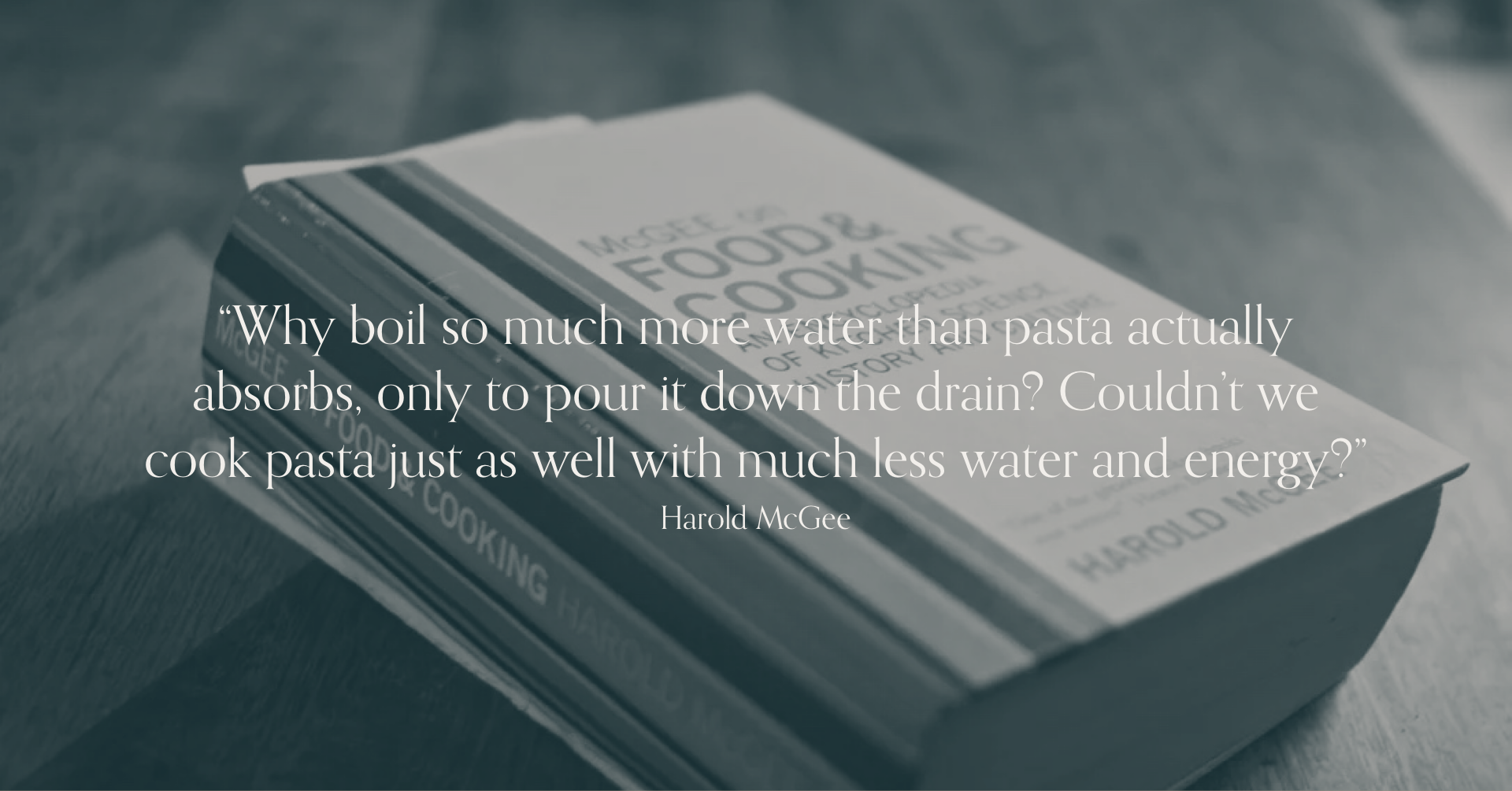Cook Smarter, So the Planet Doesn’t Get Hotter: A Planetary Plea to Use Less Water When Cooking Pasta
Traditions make up a lot of what we do in our kitchens. They serve to bring us together; often strengthening our sense of belonging with those that came and ate before us. Ultimately, these traditions make up much of what informs one’s unique culinary culture. But, traditions can change and so too does culture.
Logical as that may sound, cultural needles rarely move because of logic alone. More likely, some outside force will put pressure on a given tradition until a resilient generation steps up to figure out an alternative. Well, dried pasta, your time has come. It’s time to change how much water we use to prepare the perfect al dente pasta for the sake of the planet.
In 2009, the New York Times published an article by food science writer, Harold McGee, author of the seminal book for pro and home cooks alike, On Food and Cooking. With the headline “How Much Water Does Pasta Really Need?” it’s probably no surprise McGee’s article was nestled amongst the Cooking pages. More than a decade later, however, I propose McGee’s article belongs right alongside any article suggesting we fly less, bike more, or minimize/remove animal products from our diets for the betterment of the planet.
As the story goes, McGee was pouring excess quarts of pasta water down the drain, fogging up his glasses for the last time, when he was compelled to run some simple experiments in his home kitchen. Knowing dried pasta can absorb 1.6 to 1.8x it’s weight in water (because he literally wrote a book on it), he started by cutting the recommended 4-6 quarts of water per pound of pasta in half. Eventually McGee found he could reach the desired al dente outcome with just one fifth of what conventional wisdom had long suggested—a whopping10:1 ratio water. Turns out, this is mostly to keep noodles from sticking and to dilute the starches released into the water. (Side note: some of that extra starchy water can be reused if you’re making a thick sauce, like an alfredo).
I stumbled upon McGee’s article after recently watching a YouTube video on the same topic. Home cook and science nerd, Ethan Chlebowski, drew me in with a clickbait thumbnail with the enticing title: Why I stopped boiling my pasta water. Unlike most clickbait though, boy did the video deliver! Chlebowski tested the method with a box of standard macaroni pasta. Not only did he use just 409 grams of water rather than the suggested 2270, but the pasta was ready in just over six minutes versus nearly fourteen—53% faster! Naturally, my immediate thought was, why isn’t this being talked about more?! Especially amongst those of us who sincerely try to consider the planet in much of what we eat?
It’s important to note that these suggestions apply to dried pasta (fresh pasta absorbs water quite differently). First, completely submerge the pasta—ideally in a wide, shallow pan compared to the usually large pot. This helps increase the surface area and maximizes heat transfer from the stove. Be sure to stir the pasta to help prevent any noodles from sticking. While this method does require more attention on our part, we are ultimately saving time in the long run. Using a kitchen thermometer, set the timer per package instructions for desired doneness once the water reaches 180°. And that’s it.
There are a few simple reasons why this works. The proteins and starches in pasta begin to denature and absorb water at 180°. The boiling point of water is 212°. This means, your pasta will actually start to cook well before the water starts to boil—32° earlier! So, while you might need to stir a little more frequently to prevent noodles from sticking, the benefits significantly outweigh the cost. Plus, it’s not like anyone advises to leave the kitchen while the stove’s on.
In addition to the buzz-worthy videos advocating for each of us to go vegan (you should) or eat local, organic produce, one topic I’ve only heard only scantily discussed is the need to break up with our gas stoves. This advice flies in the face of what most discerning home cooks have long considered standard operating procedure, thanks to the nearly century-old marketing phrase, “Now we’re cooking with gas.” But, in fact, the leakages along the supply chain and a general ambivalence amongst home cooks means a lot of energy is lost along the way and wasted at the stove.
Put simply, cooking with less water means cooking with less energy; two resources for which demand is only likely increase. After some simple back-of-the-napkin calculations, McGee estimates Americans could save several trillion BTUs at the stove a year—somewhere in neighborhood of half a million barrels of oil. So, the next time your looking for a quick dinner, give this a shot. Not only will it save time but it just might help save our planet.


